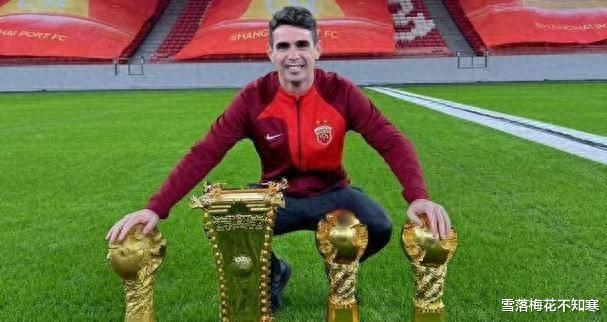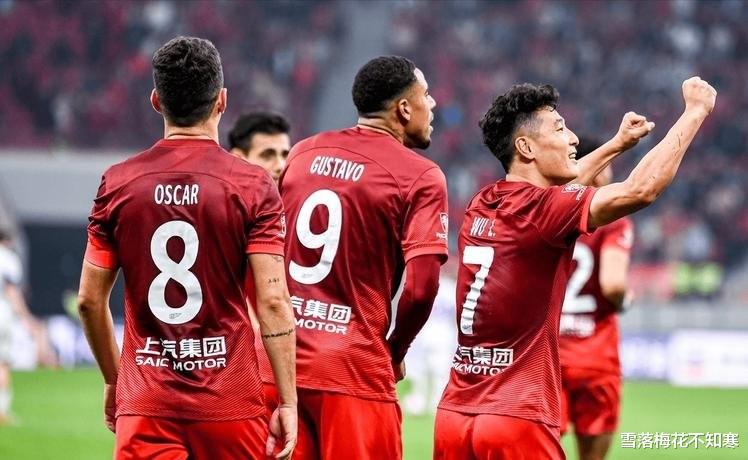In Chinese football, especially in the foreign aid market of the Chinese Super League (CSL), recent years have witnessed a significant transformation. If the foreign players in the CSL were once superstars with a dazzling aura, they are now increasingly resembling thrifty experts who not only seek excellent ball skills but also control budgets—much like those who excel at finding the most cost-effective products and reducing the "intelligence tax."

Oscar and Balagas, two former foreign players who enjoyed immense success with Shanghai Port (formerly known as Shanghai SIPG), announced their departure from the CSL. This decision reflects not only the tragedy of the club but also serves as a mirror to the entire foreign aid market of the CSL, revealing the inevitable choices that clubs must make under current economic conditions.

These two players are not ordinary; they are among the giants of the sport. Oscar, once a Brazilian national team member, and Balagas, a former tough midfielder from South America, their departure sends a message: even the wealthy clubs in the CSL must face budget constraints. It's no longer sustainable to rely solely on big-name foreign players; ultimately, they too must exercise financial prudence.

The ideal foreign player for CSL clubs now has an annual salary ranging from 100,000to150,000. What does this mean? Simply put, these players can significantly enhance the team's strength without imposing a heavy financial burden—like finding a product with high cost-effectiveness that offers both quality and affordability without depleting your monthly salary.

Why have these salary-range players become so desirable? The reason is straightforward, particularly for championship-contending teams like Shanghai Port, which face increasing financial pressures. Even large clubs must operate within reasonable budgets, and top-tier foreign players with salaries in the tens of millions of dollars have become luxuries, affordable only to a handful of top clubs.

For mid-to-lower-tier teams, while they also have foreign players, their financial resources are not as substantial, necessitating lower salaries for their foreign talent. Consequently, the gap in the level and salary of foreign players between different tiers of teams is widening. On the field, it's becoming less common to see a lineup filled with superstar foreign players; instead, we see more players who are both skilled and cost-effective taking center stage.

Even the big clubs in the CSL are beginning to exercise financial prudence. Although some clubs still possess significant financial strength, their approach to selecting foreign players is no longer as extravagant as before. The departure of superstars like Oscar and Balagas is not just a personal decision but a strategic adjustment made by the clubs under economic pressure. Clubs like Shanghai Port must consider their overall operations and cannot allow the high salaries of a few foreign players to drag down the entire club's finances.

These major clubs, despite their wealth, are also constrained by circumstances. They wish to sign high-level foreign players, but economic realities compel them to change their perspective and opt for players with strong comprehensive abilities and fair prices. Consider this: what was once a foreign player costing hundreds of thousands of dollars can now be found for just tens of thousands of dollars with similar technical prowess—why wouldn't you take advantage of that?

A netizen commented: Look, the current reshuffle at the Port is akin to corporate fine management; everything must consider ROI (return on investment)! With this move, a substantial amount of funds has been freed up, eliminating concerns about signing new foreign players.

This comment, tinged with economic reasoning, is not without merit. After all, a club's funds should not be used to chase star players but to strengthen overall capabilities and create a more balanced squad to remain competitive in the fierce league battles.

For mid-to-lower-tier teams, although their foreign player salaries cannot match those of the wealthy clubs, their selection of foreign players is equally precise. These teams, though their lineups may not sparkle with stars, often adopt more grounded and efficient strategies in their recruitment—focusing not just on fame but on the actual contributions these foreign players can make to the team. In essence, it's a high-cost-effectiveness deal. These players may not command the exorbitant prices of an Oscar but can still play a significant role on the field.

Some netizens believe that the current approach to foreign player selection provides opportunities for smaller and medium-sized clubs. After all, big clubs like the Port and Evergrande have more money than they know what to do with, but they can't do everything. By contrast, clubs like ours in the middle ranks can attract hard-fighting foreign players through precise recruitment— isn't that great?

This viewpoint undoubtedly hits the nail on the head regarding a significant trend in the current CSL market—precise recruitment has become the key to the resurgence of teams.
What will the future hold for the CSL? We must recognize a fact: regardless of how foreign player recruitment is adjusted, competition in the CSL will undoubtedly intensify. Without superstars like Oscar and Balagas, can the CSL continue to attract audiences and enhance the league's appeal? This is a significant question. Fans are no longer solely attracted by star players but hope to witness more exciting and intense matches.
To win the hearts of fans, the CSL must focus on the field, where improvements in game content and excitement are the keys to attracting viewers in the future. Relying solely on the ostentatious display of big-name players is fleeting; true competitiveness must come from breakthroughs in game quality.
For instance, there should be greater emphasis on quick transitions between attack and defense on the field, moving away from slow long passes to executing tactics such as rapid counterattacks and ground combinations. This is not only to enhance the game's appeal but also to enrich the tactical layers of the league as a whole.
A netizen proposed: There's no need for big-name players now; we watch football for the game itself. Even without world-class players, we can still enjoy thrilling offensive battles. Football is a team sport, and the impact of an individual is limited.
This statement makes sense— if the CSL can focus on teamwork and overall tactics, it might break the bottleneck of relying solely on star players.
Conclusion: The future is full of challenges but also brimming with hope. The current CSL is facing significant challenges but also endless possibilities. As the foreign aid market gradually adjusts, the future of the CSL will no longer depend on the halo of individual foreign players but more on the overall strength and tactical levels of the team.
Behind all this, the various clubs in the CSL are gradually finding their own development paths in the process of being thrifty. The future of the CSL will not merely be a league without big names but one that places greater emphasis on teamwork and tactical arrangements. What you will see are not just individual star players but richer and more exciting game content. In the near future, we will witness more foreign players with ultra-high cost-effectiveness leading the CSL to new heights!